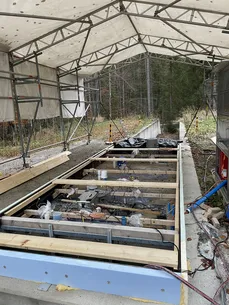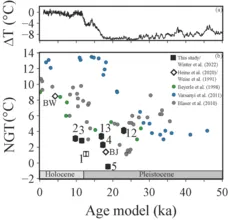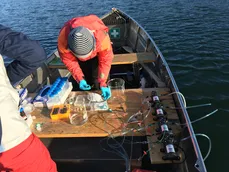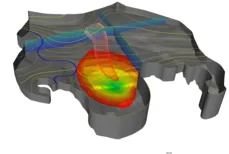Hydrogeology, Biogeochemistry and Modelling Group
Fighting against Climate Change
Methan Degradation & Emissions from Rivers and Lakes
Methane is responsible for ca. 30% of the rise in global temperatures since the industrial revolution Consequently, rapid and sustained reductions in methane emissions are key to limit near-term warming. Here we want to study the effect of different electron donor-acceptor interactions in lakes and groundwater systems to understand the anaerobic turnover processes of the greenhouse methane with nitrogen gas as electron acceptor in freshwater systems. This topic is performed in close cooperation with the LMU (Prof. Bill Orsi) and the Limnologische Station of TUM (Prof. Jürgen Geist)

Redox Processes within Chemical Gradients
Although many studies have investigated the degradation of contaminants in aquatic systems we know only little about the specific processes occurring within chemical gradients. Here it is essential to understand transformation processes as a function of chemical gradients in aquatic systems. The hyporheic zone (HZ) is of major importance for carbon and nutrient cycling as well as for the ecological health of stream ecosystems. However, biogeochemical observations in this ecotone are complicated by a very high spatial heterogeneity and temporal dynamics. Here we study the bottlenecks of microbial turnover of methane on climate change.
Reducing high levels of nitrate in groundwater has been a target of water workers and the EU policy. Over the last couple of years we have studied denitrification processes in groundwater. It was shown that lack of denitrification can mostly be explained by lack of microbial available electron donors. Therefore, since 2023, we have been starting a projekct to develop a technique to clean-up nitrate polluted aquifers.

Understanding complex groundwater systems
Environmental Isotopes
One of our most important tools for the identification and quantification of biogeochemical processes in complex aquifers represents the stable isotope technique. On the one hand we investigate the principal mechanism of stable isotope fractionation with focus on environmental parameters controlling the extent of stable isotope fractionation. In cooperation with national and international partners we also perform laboratory and field experiment to learn more about biogeochemical processes using isotopes.
Furthermore, we use radioactive isotopes such as 14C-DOC and 81Kr and noble gases to characterize the apparent water ages to understand local and regional groundwater flow systems. By applying noble gas concentrations with mathematical models such as He, Ne, Kr, and Ar we also use the groundwater as paleoarchive to provide information on paleotemperatures in Europe.
Groundwater Modelling
Numerical groundwater models are essential tools in hydrogeology and water resource management for understanding, predicting and managing groundwater systems. They help in assessing origin, quantity and quality of groundwater resources. They are the primary tool to assess the resilience of groundwater systems to drought conditions and the challenging impacts of climate change. This is crucial for sustainable water management, especially where groundwater is a primary source for drinking water, irrigation and industrial use. Groundwater models serve as decision support systems (DSS) and support sustainable insights into the consequences of different management strategies.
The modeling group studies flow and transport processes in the saturated and unsaturated zone as well as the interactions with connected water systems (surface-water, urban water) from microscale systems (hyporheic zone) up to large continental deep basins. We link groundwater models dynamically with field investigations and water age dating tools. We extend the numerical models with uncertainty analysis, use inverse modeling techniques and apply AI-support to modeling workflows. We include stable and radioactive isotopes for simulating groundwater ages. To reach all these goals we use FEFLOW as one of the worldwide leading groundwater modeling software packages.
Modeling of groundwater-soil-plant interactions and chemical fate
Plants play an important role in the water cycle and may also significantly impact the fate of substances in the subsurface. Nonetheless, feedback mechanisms between plants and hydrological systems have received little attention to date and there are numerous open research questions. We aim at improving the understanding of coupled hydraulic and chemical processes in the groundwater-soil-plant-atmosphere system.
This includes transport and fate in groundwater, the unsaturated zone and vegetation. Processes may include advective and diffusive transport as well as sorption and biodegradation, including the accumulation of pollutants and metabolites. We are also investigating microbial growth and degradation kinetics. Chemical residues in environmental matrices like soil, groundwater and vegetation can pose severe threats to ecological receptors and human health.
We are developing and applying mathematical models for these questions. One focus of our work is on evaluating impacts of pesticide residues in plants on pollinating insects like bees. This is done by combing laboratory and field observations with modeling. Overall goals are also to minimize risks from chemicals to organisms/ecosystems, groundwater, and human health.

